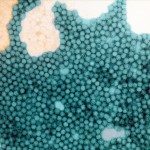Lien vers Pubmed [PMID] – 16157509
Mol. Ther. 2006 Jan;13(1):142-50
Small interfering RNAs (siRNAs) have been developed as antiviral agents for mammalian cells. The capacity of specific siRNAs to prevent virus infections has been demonstrated, and there is evidence that these new antiviral agents could have a partial therapeutic effect a few days after infection. We investigated the possibility of curing a persistent infection, several months after becoming established, using an in vitro model of persistent poliovirus (PV) infection in HEp-2 cells. Despite high virus titers and the presence of PV mutants, repeated treatment with a mixture of two siRNAs targeting both noncoding and coding regions, one of them in a highly conserved region, resulted in the complete cure of the majority of persistently infected cultures. No escape mutants emerged in treated cultures. The antiviral effect of specific siRNAs, consistent with a mechanism of RNA interference, correlated with a decrease in the amount of viral RNA, until its complete disappearance, resulting in cultures cured of virions and viral RNA.
